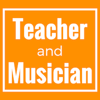Levelling Up
Back in the 1990s, I was an avid video gamer. I could run Sonic the Hedgehog through the Chemical Plant Zone faster than the contenders on Gamesmaster, I knew every special move on Street Fighter II and I won a city-wide competition based on the opening level of Doom. I would often justify time spent playing games by referring to hand-eye co-ordination and interactive storytelling. Truth be told, I’m pretty sure that I was just addicted to the feeling of victory whenever I completed a level. Every once in a while, I see the level-completing-teenaged-me in the grade-obsessed-teenaged-musicians of today.
These young musicians will often measure their competence with a number, “I’m Grade 4 on the piano”, as if that tells me everything I could possibly want to know about their musicianship. Their parents may even chip in with further measurement designed to inspire awe and wonder, “Yes, Grade 4 Distinction”. I would never knock these achievements (they’re hard won by pupil, parent and teacher alike) but the long-gone teenaged video gamer in me always wants to respond with “That’s fantastic! What level did you get to on Flappy Bird?”. There just seems to be so much more to musicianship than a number from an examiner.
I sometimes wonder if my attitude to grades comes from the fact that I’ve never taken a grade exam myself. In fact, aside from my music GCSE and A-Level, I’ve never taken a formal performance assessment exam (unless you count a few auditions for various gigs). Of course, I’ve done more than my fair share of practising over the years (practice being the musical equivalent of a video game’s power up) and taken pride when I’ve mastered an especially daunting piece. It’s that particular type of joy that I wish on all musicians – joy at achieving something new.
Musical achievement can be just as addictive as helping Mario to rescue Princess Peach. The sense of reward can come from years spent mastering a new instrument, months spent mastering a concerto, weeks spent refining an improvisation or days spent learning to play the theme tune from Zelda. The source of that sense of achievement seems irrelevant. What really does matter is that musicians constantly challenge themselves and try new things. While gamers may get their sense of adventure on Monkey Island, musicians have hundreds of years of musical history to explore.
A whole host of musical tradition can be accessed through the well-curated grade syllabi from the likes of ABRSM, Trinity and RSL. Young musicians should certainly be encouraged to explore this rich musical resource and the reliable framework that it provides for progression. All of us, however, should be looking for the next challenge – the piece of music that forces us to level up and become a better musician. After all, those special moves I mastered in Street Fighter are nothing compared to my killer version of Erroll Garner’s Misty.

